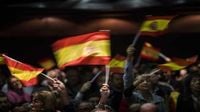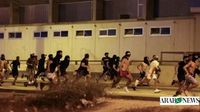In the quiet southeastern Spanish town of Jumilla, a new municipal ban has ignited a fierce national debate over religious freedom, identity, and the future of multiculturalism in Spain. Passed in early August 2025, the controversial measure prohibits religious gatherings in public sports centers and community venues—a move that overwhelmingly affects the town’s Muslim community, which has long relied on these spaces to celebrate major religious holidays like Eid al-Fitr and Eid al-Adha.
The ban, approved by Jumilla’s conservative local government, comes at a tense moment for the region. Just weeks earlier, the neighboring town of Torre-Pacheco was rocked by anti-migrant unrest after an elderly resident was assaulted by individuals reportedly of Moroccan origin, sparking days of riots and a heavy police response. According to El País and the Associated Press, more than 100 officers were dispatched to quell the violence, which saw locals arming themselves and searching for foreigners. The unrest has left the area on edge, with many residents—especially those from migrant backgrounds—feeling vulnerable.
Jumilla itself, a town of about 27,000 people nestled among vineyards and olive groves, is home to a sizable Muslim minority, making up roughly 7.5% of the population. For years, the Muslim community has used public halls and sports centers to host large gatherings for religious festivals, providing a sense of belonging and continuity far from their countries of origin. But that tradition has now been upended.
The new regulation, initially proposed by the far-right Vox party and later amended and passed by the center-right Popular Party (PP), states that municipal sports facilities and other public spaces may only be used for athletic activities or events organized by the town government. It explicitly forbids "cultural, social, or religious activities foreign to the City Council," a phrase that critics say is a thinly veiled reference to Islamic celebrations. As reported by El País, the ban is the first of its kind in Spain, raising fears it could set a precedent for other municipalities.
Supporters of the measure, particularly within Vox, have framed it as a defense of Spain’s Christian heritage. In a post on X (formerly Twitter), Vox’s Murcia branch declared, "Spain is and always will be a land of Christian roots!" The party’s national leader, Santiago Abascal, echoed the sentiment, insisting, "We must protect public spaces from practices foreign to our culture and our way of life. Spain is not Al-Andalus." The statement references the centuries-long period when much of Spain was under Islamic rule, a legacy still visible in the country’s architecture and language.
Jumilla’s mayor, Seve González of the PP, has insisted the ban is not targeted at any one group. In comments to El País, she explained, "Our administration’s goal is to promote cultural campaigns that defend our identity." González argued that restricting municipal facilities to sports and government-organized events ensures that public spaces remain neutral and inclusive. Yet, for many in Jumilla’s Muslim community and beyond, the message is clear: their traditions are not welcome in the public square.
The backlash has been swift and vocal. Spain’s Migration Minister Elma Saiz condemned the decision as "shameful" on August 8, urging local leaders to "take a step back" and apologize. Speaking to broadcaster Antena 3, Saiz emphasized, "Such measures harm citizens who have been living for decades in our towns, in our cities, in our country, contributing and perfectly integrated without any problems of coexistence." She described the ban as a threat to the social cohesion that has allowed communities like Jumilla to thrive.
Religious leaders have also voiced their alarm. Mohamed El Ghaidouni, secretary of the Union of Islamic Communities of Spain, called the measure "institutionalized Islamophobia," criticizing the justification that Muslim festivals are "foreign to the town’s identity." He argued, "The ban clashes with the institutions of the Spanish state that safeguard religious freedom." Mounir Benjelloun Andaloussi Azhari, president of the Spanish Federation of Islamic Organizations, told El País, "They’re not going after other religions, they’re going after ours. We’re rather surprised by what’s happening in Spain. For the first time in 30 years, I feel afraid."
Critics have also raised legal concerns, pointing to Article 16 of Spain’s constitution, which guarantees religious freedom. Francisco Lucas, the Socialist leader in the Murcia region, accused the PP of violating the constitution and putting social cohesion at risk "simply in the pursuit of power." Former Jumilla mayor Juana Guardiola questioned the very notion of "identity" invoked by the ban, asking, "What do they mean by identity? And what about the centuries of Muslim legacy here?"
The debate in Jumilla is emblematic of a broader struggle over national identity and pluralism playing out across Spain and much of Europe. In recent years, right-wing and far-right parties have gained ground by promising to defend traditional culture against the perceived threat of immigration and multiculturalism. Vox, in particular, has emerged as a major force in Spanish politics, forming coalitions with the PP and pushing the political conversation further to the right. In 2023, the two parties controlled six of Spain’s 17 regional parliaments, though Vox later withdrew from these coalitions over disagreements about migrant resettlement.
Elsewhere in Europe, similar measures have sparked controversy and legal challenges. In Monfalcone, Italy, a far-right mayor banned prayers in a local cultural center, prompting protests by thousands and an ongoing court battle. In the United States, debates over the separation of church and state continue to shape national politics, with policies under the Trump administration drawing both praise and condemnation for their impact on religious minorities.
The situation in Jumilla has left many worried about the direction Spain is heading. While supporters of the ban see it as a necessary step to preserve local traditions, opponents warn it risks eroding the very freedoms that underpin Spanish democracy. As tensions simmer, the fate of Jumilla’s Muslim community—and the broader question of what it means to be Spanish in the 21st century—hangs in the balance.
For now, the sports halls and community centers of Jumilla will stand empty during the next Eid, a silent testament to a community caught between integration and exclusion. The repercussions of this decision are likely to echo far beyond the town’s borders, shaping the national conversation about identity, belonging, and the future of Spain’s multicultural society.


